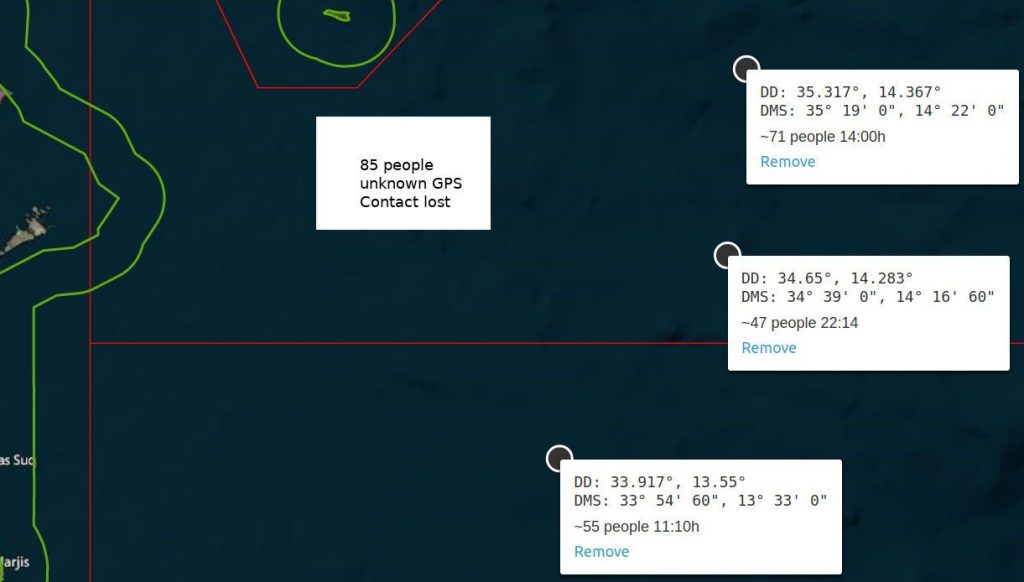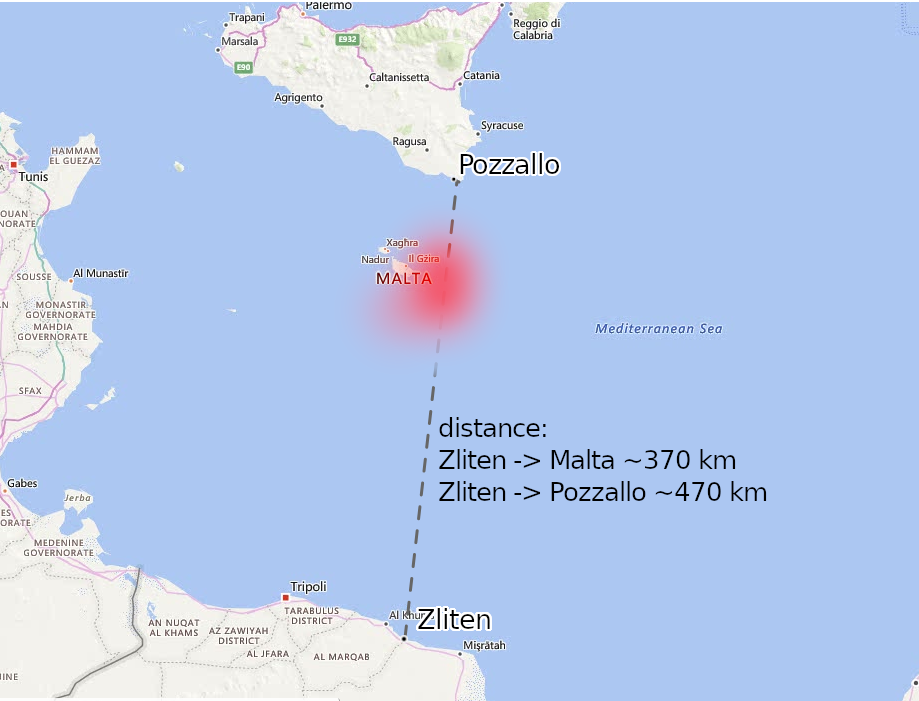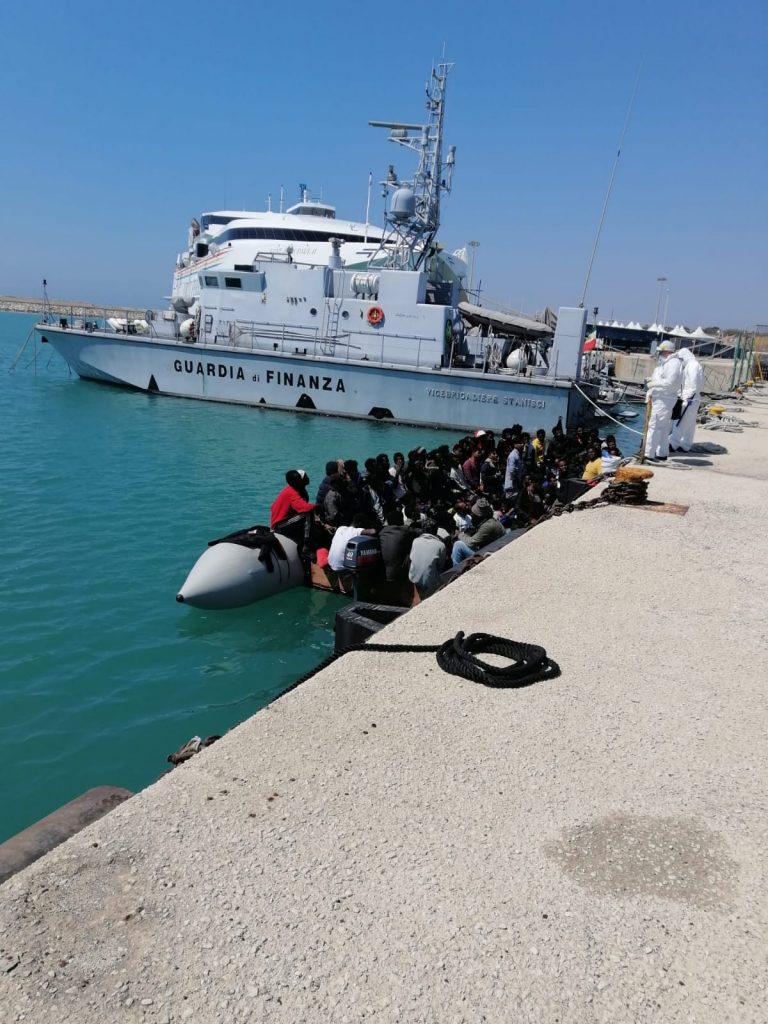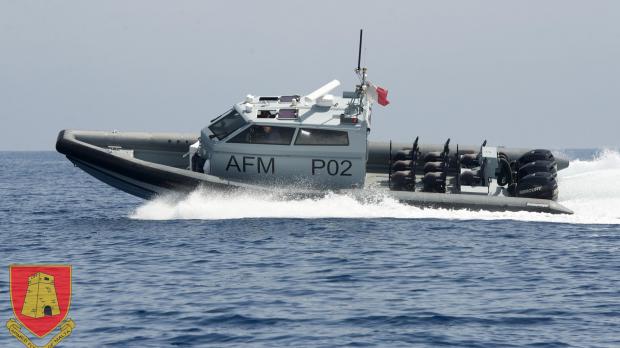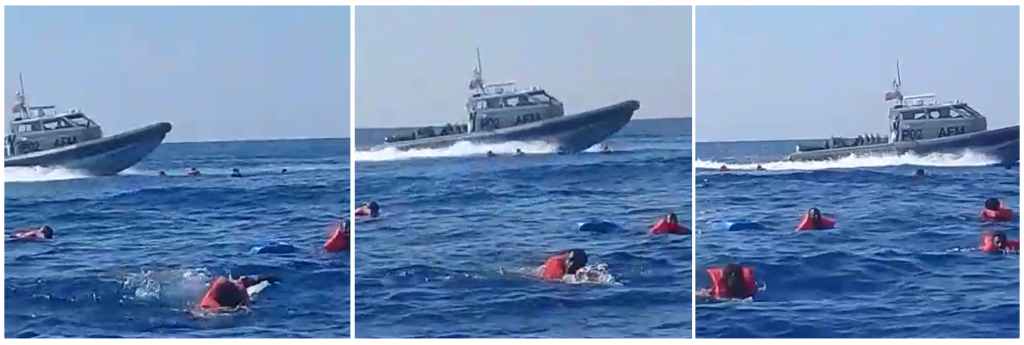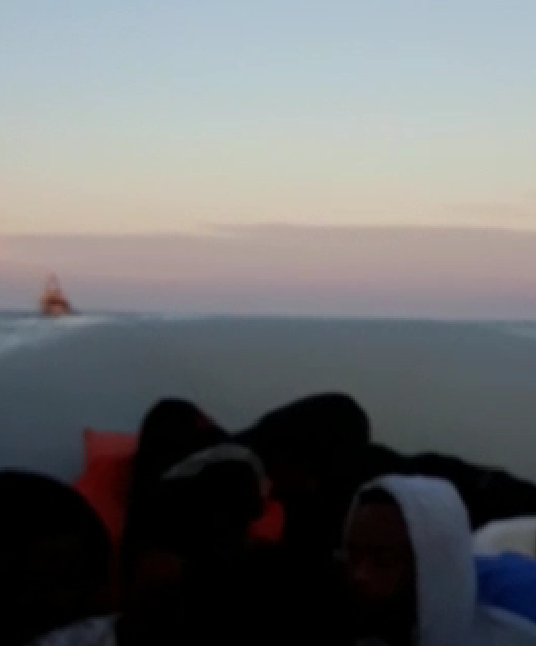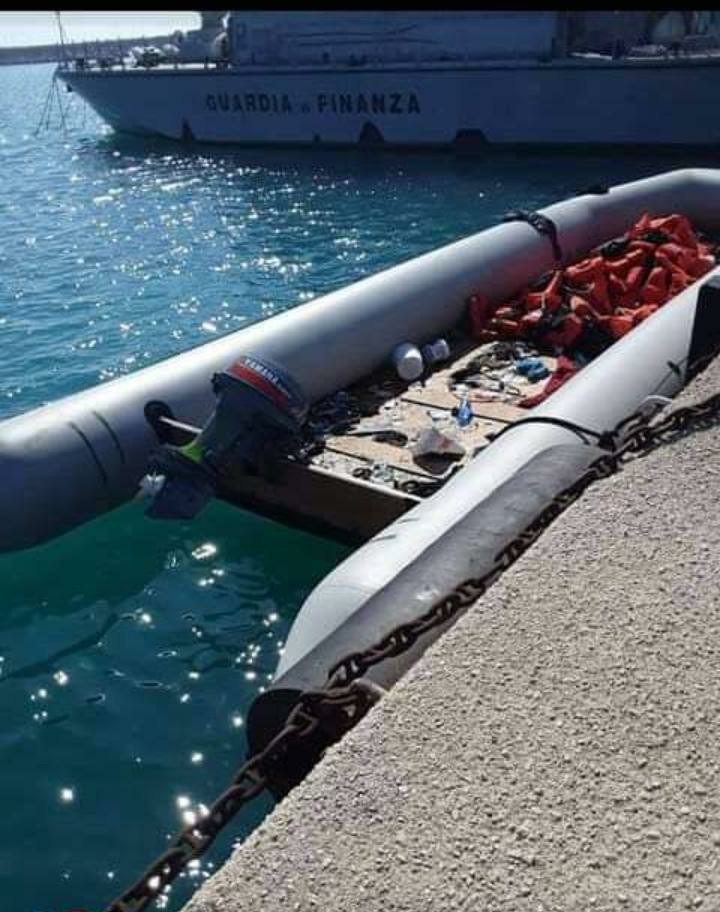Witness testimonies and video evidence suggest that the Armed Forces of Malta endangered the lives of 101 people in distress before facilitating their arrival in Italy
The Easter weekend was violent and deadly in the Mediterranean Sea. Shortly after Italy and Malta declared their harbours ‘unsafe’ and closed for migrant landings, migrant boats were left adrift in European Search and Rescue (SAR) zones while being surveilled by European authorities from the air. Several people in distress were left to die, starving or drowning while being closely watched by Malta and Frontex.[i]
Four boats had reached out to Alarm Phone during those days around Easter, 10-13 April 2020.[ii]
- One boat with 47 people on board was left adrift in the Maltese SAR zone for several days. Only due to the intervention of the NGO Aita Mari were they rescued on 13 April.
- A second boat with 77 people on board arrived autonomously in Portopalo di Capopassero, Sicily, on 13 April.
- A third boat with 63 people on board was illegally pushed back to Libya on 14/15 April. 12 people died due to Malta’s failure to assist and to bring them to a place of safety.
- A fourth boat with 101 people on board reached Pozzallo, Sicily on 12 April (the people in distress had reported that there were 85 people on board when they reached out to the Alarm Phone).
The four cases around Easter. The numbers of people on board as shown on the map were the estimates of the people in distress at the time. The real figures often differ by a few people. Source: Alarm Phone
With regards to the fourth boat, many wondered how a flimsy, overcrowded and unseaworthy rubber boat had been able to navigate about 500 kilometres from Zliten, east of Tripoli in Libya, all the way to Pozzallo, south of Sicily in Italy. Indeed, the mayor of Pozzallo, Roberto Ammatuna, argued: “It is undoubtedly the new strategy of the traffickers, who most likely transferred many desperate people from a mother ship to a smaller boat.” Little did he know that in this case, those who facilitated the arrival of the boat to Italy were, according to survivors, the Armed Forces of Malta (AFM).
Map: Zliten-Pozzallo. Source: Alarm Phone
A few weeks after their arrival in Italy, some of the 101 survivors of this fourth boat re-connected with Alarm Phone and shed light on what happened to them during their journey across the sea. The video evidence they shared as well as their testimonies raise grave concerns about the behaviour of the AFM. After failing to assist, and even directly endangering and threatening the people in distress, the survivor testimonies highlight how the AFM provided fuel, an engine, and GPS coordinates to the distressed and instructed them to continue to Italy – practices commonly associated with smuggling operations.
This is certainly not the first time that the AFM have engaged in violent and illegal activities. Over recent months, and especially in April 2020, Alarm Phone has documented how the Maltese authorities have orchestrated push-backs from within the Maltese SAR zone, have sabotaged migrant boats, have failed to render assistance and to bring people to safety, and have left migrants to die off the Maltese coast while organising their forced return to Libya by private vessels.
A Chronicle of State Violence and State Smuggling
The 101 people who arrived in Pozzallo on 12 April 2020 had reached out to Alarm Phone on Friday 10 April at 22:28h CEST. However, after the initial distress call, contact could not be re-established. Alarm Phone was initially told that there were about 85 people on board, and we never received a GPS position of the boat in distress.
Pozzallo Harbour
After a boat with 101 people reached Pozzallo, relatives who had contacted Alarm Phone, recognised their loved ones on videos of the people disembarking. Despite the difference in numbers of people on board (85 and 101), we were able to confirm that this was the same group that had reached out to us. However, as the survivors were placed in quarantine, we were not able to reconstruct their journey earlier.
Weeks later, on 3 May, one of the survivors reached out to Alarm Phone. Since then, we have gathered video evidence and several testimonies of survivors that allow us to provide the following account of events that unfolded while the 101 people were in distress at sea.
Encountering the Armed Forces of Malta
According to the survivors, the group of 101 people departed from Libya by boat in the late evening of 8 April 2020 and moved north. On what appears to be the morning of 11 April, they had Malta in sight. First, an unidentified commercial vessel approached them and told them they were nearby “Marsa” (meaning “harbour” and possibly referring to different Maltese harbour towns). After the vessel left, a white, yet unidentified vessel, approached them to distribute life vests before vanishing again.
Survivor A: When we left from Libya, we were going in the sea for two days. We saw commercial vessels, big ones. They didn’t approach us at all. Anyways, the third day in the morning, around 5am in the morning, when the sun started rising, we saw Malta, we saw the buildings of Malta. Everyone was happy and yelling and we said we reached Malta.
We were arriving until a vessel found us. A commercial vessel it seems, Turkish one. Written Turkya on it. It had a red flag with a moon and star (…). He said hello to us with a microphone. He told us you arrived to Malta’s zone, where do you want to go? He went down to a small boat and came to us until our boat, said hello and said this town is Malta and this exact city is called Marsa. Keep going for a distance of 30 minutes and you will find yourselves in Marsa and go turn yourselves in. We asked him, is it possible you take us onboard and accompany us? He said, no I can’t, I have a commercial vessel. Anyways, he went back with his small boat to his vessel and went away. And we were standing by, we didn’t move.
Then another vessel came, its colour was white. They gave us red life vests. He asked us how many people we were, we counted and told him we were 101. He said ok and gave us life vests, one by one. Without talking to us at all. Anyways, they left, we put our life jackets on and we started moving. We moved until we arrived near to this city called Marsa. Until came to us the armed forced of Malta.
The survivors state that, later, an AFM vessel approached them. As is clearly recognisable in the video footage, it was the AFM vessel P02.
Official picture of AFM PO2. Source: Armed Forces of Malta
According to the survivors, the AFM officers then requested their satellite phone into which the officers inserted a GPS location for Libya. The phone was handed back to the people in distress and they were requested to return to Libya.
Alarm Phone: That video was taken when you were very close to Marsa?
Survivor A: Yes. When we arrived to Marsa, a small plastic vessel came to us. It’s like our vessel but that one was small.
Alarm Phone: That was the vessel from the video?
Survivor A: Yes, this happened just before the video. We find ourselves, our fuel was over and we still were in a distance of 30 minutes from the city. They told us, ‘give us your GPS and your Thuraya phone’. We gave them the Thuraya phone. They told us ‘give us your GPS’, we gave them the GPS. They changed the configurations from Malta so we go back to Libya. They told us go back to Libya and configured the GPS.
According to the survivors, AFM officers threatened them and tried to force them to turn around and head back south. Frightened by these actions and seeking to enforce rescue by the Maltese military, several people jumped into the sea, risking their lives, though fortunately wearing life vests.
Instead of proceeding to immediately rescue those overboard, and as is visible in the video footage, the survivors state that the AFM drove dangerous manoeuvres close to people in the water, further endangering their lives and those still on the rubber boat.
Survivor A: We said no, we won’t go back to Libya, we made it to Malta. Anyways, we jumped into the water. When we were in the water and started swimming, they started turning around with the launch [small boat, the PO2] so we won’t swim to the city. They started doing that to not us let moving forward. The people in the water, me as well I was one of them and I was wearing heavy clothes and wearing the life jacket. And my heavy clothes were pulling me down and the water was heavy. None of us were used to swim in the sea before. They were around 20 or 25 people jumping in the water almost drowning. When they saw us like this, they gave us ropes and told us to hold on to the ropes and tight it to your boat and go back to your boat. We won’t make you go back to Libya. We told them no you will return us to Libya, we will not move. Then, a big vessel came, a big one. The colour of this vessel is grey. Between grey and white with Malta flag.
Survivor B: When we got into the water, they were likely to kill us. They made waves, and we drank sea water, and we were very tired because the sea water was very salty. Sea water is very salty. They have done all this so that we wouldn’t go into Malta.
Instead of immediately rescuing those overboard onto its vessel, the AFM provided ropes so that they could climb back into the rubber boat. According to survivor testimonies, a second AFM vessel arrived at the scene and an officer informed the distressed that Malta was infected by the virus and unable to accept more people. A survivor reported that the Maltese forces threatened them even by pointing with several guns at them.
Survivor A: They came to us and a man was talking to us. A tall man, wearing black clothes. He said, ‘Malta has a virus called corona if you heard about it. We can’t take you there, everyone is sick in Malta. And Malta is small and can’t take all of you.’ When we didn’t go back to our boat, they saw that we didn’t want to go on the vessel. 3 people of them wear the tools of police and arms around and attached to their belts they put with clashs [rifles] and guns. They stand up in front of us up on their vessel. On the balcony of the high vessel. They stood up there and put up their arms and told us we give you 30 minute.
Alarm Phone: You mean, they threatened you with their arms?
Survivor A: Yes they had arms, three clashs and three guns. The guns were tight to their arms and the clashs were in their hands. When they put their arms up, we got scared. We took the ropes and got back to our boat. They distributed water to us, 35 small bottles of water of quarter of a litre, 250ml.
Survivor B: They just raised their guns to scare us and didn’t shoot us. We were very tired, but they told us to go back…They wouldn’t let us in, but we were all tired of being at sea.
The Maltese forces are then said to have tied ropes to the rubber boat and to have started to pull it. During this manoeuvre, Survivor A reports, the engine of the rubber boat broke: “when they pulled us with the rope, the engine broke and the launch hit it many times.” One survivor also stated that an air asset was present at the scene which had come from the the direction of Malta.
The people in distress were determined not to return to Libya and made this clear to AFM officers. According to them, the AFM then proceeded to provide not only five gallons of petrol and an engine, but inserted GPS coordinates into the satellite phone and instructed them to continue their journey to Italy.
Survivor A: When we took the water, it was around 11am in the morning. The sun was there but not strong. Until around 2 or 3pm the sun was moving to the other direction, they told us ‘ok we made a decision we won’t return you to Libya’. All of us were happy and yelling ‘Allah Akbar’. They told us ‘we will show you the route until Italy’. We said ‘no we don’t have fuel’. They said ‘ok we will give you fuel’. They gave us 5 gallons, 40 liters. They told us ‘take these’. The gallons colour was black and something was written on it in English. They gave it to us. We took it.
We turned on the motor and it didn’t work. We told the big vessel that the small launch attached a rope to our boat to try pulling us back and it hit the engine many times and the engine broke. They gave us an engine 45 or 40 Yamaha. After they gave us the engine, we attached it and we put the fuel and they gave us a compass in a wooden box. They told us there two zeros, when the arrow is directed to the two zeros, go that way until you find yourselves in a city in Italy. We said ok. At that time, we started moving and the sun went down, it was around 5 or 6pm. We kept moving until the next day around 10am in the morning we arrived to Italy.
According to the survivors, an AFM vessel (an orange vessel, not yet identified) accompanied them in the direction of Sicily before eventually leaving the scene.
AFM vessel in the background
Survivor B: Then the big boat came to us, and told us ‘come behind me, follow me’. We left Malta on our left, and we were on its right, so we didn’t enter Malta. We saw the lights of Malta, and they said come behind us, come behind us, but don’t go in Malta. We went behind him for 12 hours, the whole night. From 6:00 in the afternoon until 6:00 in the morning. They gave us fuel. And early in the morning they told us to always go straight ahead, ‘don’t go this way or that way’. It left us at sea and he left. Then we went until we got to Italy. There was no one who helped us until we got to Italy…
Survivor C: There was a guy that told us there are so many people in the Mediterranean sea and I would like to take you to Italia, if you can follow me, – he says, we do not have any protection for the corona virus on this ship, so you have to follow me from behind. They told us ‘I was sent by the government, so I was saving the life of the people in the Mediterranean sea, I can’t kill you and I can’t torture you, I am not threatening you but if you can follow me up to Italia I will save your lives’, he told us to follow them. We follow them during the night at around 6 like that. They took us up to the Italia, and early in the morning, after we reached Italia they told (us) Italia is not far away from here, Italia is there, so they told us Italy is there, go ahead, we go back to the Malta. They told us we can’t push you up to Italia, he means to the port, so we will going to return to our country, so Italy is there so go and enter.
The 101 people arrived at Pozzallo harbour on 12 April 2020 and were placed under quarantine.
Empty boat at Pozzallo after disembarkation
Questions to Maltese authorities
While we are glad that the 101 people in distress eventually reached a place of safety, we have several questions about the behaviour of the AFM which, instead of immediately rescuing and bringing people to safety as they are legally obliged to do, appear to have further endangered their lives.
Can you specify where this incident took place? Did it take place within the territorial waters of Malta? What AFM vessels were involved in this case?
Do you consider the manoeuvres driven by the AFM vessel P02, as shown in this video, in line with Search and Rescue operation standards?
Do you consider people on an overcrowded rubber boat, as well as those already in the water at risk of drowning close to the Maltese coast, a distress situation?
Is this the first time that you have told a migrant group on a boat near the Maltese coast to return to Libya?
Is this the first time that you have provided people in distress at sea with GPS positions, petrol and an engine so that they could proceed to Italy?
Questions to Italian and European authorities
Were the Italian authorities informed about this case of 101 people in distress and about the presence of this boat before its arrival to the shores of Sicily?
If so, which measures were taken by the Italian authorities to protect the lives of people on board this boat?
Was this boat monitored by any EU, Italian or Maltese air assets, either when on its way from Libya to Malta, or from Malta to Italy? If so, which measures were undertaken, and which authorities informed?
Do the institutions of the European Union deem such actions by one of its member states, Malta, permissible? Will there be any repercussions for a member state that blatantly violates human rights conventions, asylum and maritime laws? Will there be any repercussions for the EU border agency Frontex that has been involved in the spotting of migrant boats through aerial assets?
___
[i] Many boats reached out to Alarm Phone in the days preceding the Easter weekend. Also in several of these cases could we document forms of delay, non-assistance, and sabotage. See: https://alarmphone.org/en/2020/04/11/the-covid-19-excuse/
[ii] See: https://twitter.com/alarm_phone/status/1249083297474412544?s=20, https://twitter.com/alarm_phone/status/1249401608720523268?s=20, https://twitter.com/alarm_phone/status/1248989362399989761?s=20
